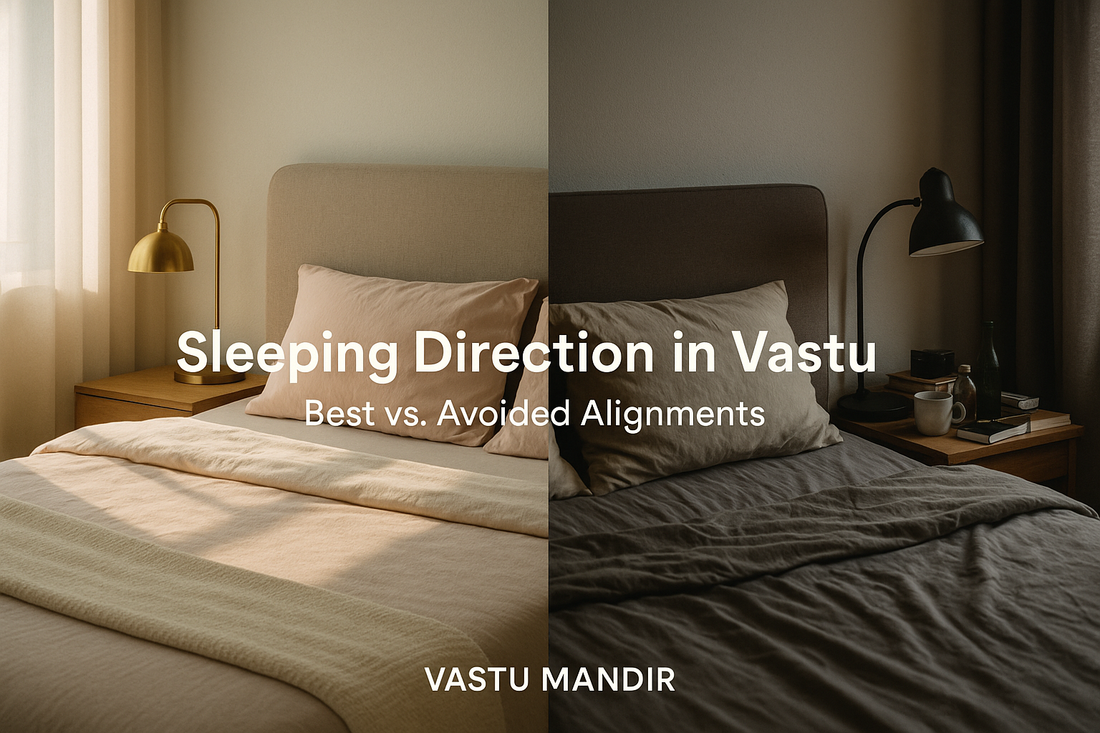
Sleeping Direction in Vastu: The Science & Tradition Explained
Vastu MandirShare
Why Sleeping Direction Matters in Vastu
We rarely think about which way our head points while sleeping. Yet in Vastu, this simple detail is considered central to health, rest, and peace of mind.
The bedroom is the chamber of renewal — where the body’s energy restores itself every night. Vastu suggests that the direction of the head during sleep affects not only rest, but also how the mind and body align with nature’s rhythm.
South-Facing Head: The Most Recommended
-
Sleeping with the head towards south is considered most auspicious in Vastu.
-
It is believed to align the body with Earth’s magnetic field, encouraging deep and restorative sleep.
-
Families who follow this often report feeling more grounded and balanced.
Modern science agrees: blood contains iron, and aligning southward may reduce magnetic interference with blood flow. This could explain why it feels more restful.
East-Facing Head: Clarity & Vitality
-
Facing east while sleeping is linked with clarity, focus, and spiritual growth.
-
Students and professionals are often advised to choose this direction for sharper memory and concentration.
-
It symbolizes the rising sun — fresh energy, new beginnings.
A bedroom aligned to the east feels brighter and mentally lighter.
West-Facing Head: Practical & Acceptable
-
West-facing beds are acceptable in modern apartments.
-
This direction is believed to bring practicality, discipline, and steady progress.
-
It may not feel as calming as south or east, but it is not considered harmful.
For working professionals, west-facing sleep can feel like a balance of structure and drive.
North-Facing Head: Best Avoided
-
In Vastu, sleeping with the head towards north is strongly discouraged.
-
It is said to disturb rest, invite stress, and weaken health.
-
Modern reasoning: head pointing north creates magnetic repulsion with Earth’s field, which may disturb circulation.
If layouts force a north-facing bed, corrections become important.
Blending Vastu with Science
What makes sleeping direction unique is how tradition and science overlap.
-
South and east feel more restorative and clear.
-
North can disrupt rest because of magnetic alignment.
-
West offers stability and practicality.
In the end, the best direction is one that feels aligned both physically and emotionally.
Remedies When Bed Placement Cannot Change
Modern apartments don’t always allow bed shifts. Instead of worry, Vastu offers simple remedies:
-
Brass or copper strip at threshold: Creates symbolic balance when bedroom orientation feels misaligned.
-
Pyramids: A discreet pyramid placed in the room is believed to stabilize disturbed directions.
-
Calming idols: A serene Buddha idol or brass tortoise in the corner helps anchor peaceful energy.
-
Brass diya ritual: Lighting a diya briefly in the evening softens restlessness and creates a calmer atmosphere before sleep.
These are not about superstition — they’re about intention. Objects, light, and symbols remind us to treat the bedroom as a sanctuary.
Summary
Sleeping direction in Vastu is more than tradition — it is about creating restful alignment with nature.
-
South-facing head brings stability and deep rest.
-
East-facing head encourages clarity and focus.
-
West-facing head is acceptable, though less calming.
-
North-facing head is best avoided.
When layouts cannot be altered, simple remedies like brass strips, pyramids, or calming idols restore balance. Ultimately, the bedroom becomes a chamber where body, mind, and spirit rest in harmony.
